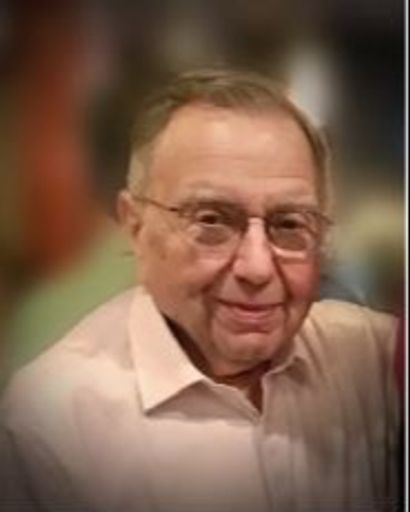

Richard Malcolm Herman
January 26, 1928 — December 28, 2024
Phoenix
Dr. Richard M. Herman of Phoenix, Arizona, passed away on December 28, 2024, just shy of his 97th birthday. He leaves behind a legacy of love as a devoted husband and father.
Richard often spoke proudly about his three successful children of his first marriage, William Herman (Sandra), Dr. Ruth Steinman (Dr. David), and Susan Herman (Agapito Benavides), who gave him six beloved grandchildren, Taylor Herman (Mika), Kendall Herman (Alex Colucci), Jacob Steinman, Eliana Steinman, Austin Benavides, and Callista Benavides. He also described how he treasured his subsequent marriage of 30 years to Janice Tearse Hunt and was proud to help influence her three children, Geoffrey Hunt (Sarah), Katie Banovich (Dr. Nicolas), and Margaret Foster (Richard), as they grew into adulthood and married. Later he found great joy in being called Grandpa by her six grandchildren, Emery Banovich, Greyson Banovich, Liam Hunt, Lainey Hunt, Jace Foster, and Raelyn Foster.
Born on January 26, 1928, to Mini and Morris Herman in Brooklyn, New York, Richard’s life was marked by a dedication to lifelong learning and discovery. In 1948 he graduated with a Bachelor of Science degree in physical chemistry from Western Reserve University. He went on to earn a Certificate in Physical Therapy from New York University, then served in the Medical Service Corps as a U.S. Air Force Second Lieutenant. He then earned a Medical Degree from Queen’s University in Belfast, North Ireland, where he was affectionately known as the American “Yank”. In 1955 he used this unique point of view to found The Gown, the student newspaper which is still published today. Returning to New York as a physician, he interned at Kings County Hospital in Brooklyn followed by residency in Physical Medicine and Rehabilitation at the Albert Einstein College of Medicine in Bronx, NY.
Dr. Herman's career was distinguished by his commitment to interfacing the three pillars of patient care, research, and education over more than seven decades. He held numerous prestigious positions in healthcare and academia, including director roles at notable rehabilitation centers and colleges, including:
• Director of Krusen Center for Research and Engineering at Moss Rehabilitation Hospital in Philadelphia from 1970 to 1981,
•Director of Rehabilitation Research & Training Center at Temple University in Philadelphia from 1971 to 1982,
•Professor and Chairman of the Department of Rehabilitation Medicine at Temple University School of Medicine in Philadelphia from 1971 to 1977,
•Adjunct Professor of Biomedical Engineering at Drexel University in Philadelphia from 1971 to 1982,
•Director of Rehabilitation Engineering Center at Moss Rehabilitation Hospital in Philadelphia from 1972 to 1982,
•Director of Rehabilitation Medicine and Brain Research Laboratories of American Oncologic Hospital at Fox Chase Cancer Center in Philadelphia from 1977 to 1982,
•Research Professor of Department of Neurosurgery at Temple University in Philadelphia from 1979 to 1982,
•Research Professor at Department of Surgery (Neurosurgery) at Dartmouth Medical School in Hanover, NH,
•Director of Rehabilitation Medicine Unit and Human Performance Laboratories at Catholic Medical Center in Manchester, NH from 1982 to 1987,
•Medical Director of Samaritan Rehabilitation Institute at Good Samaritan Regional Medical Center in Phoenix, AZ from 1987 to 1993,
•Research Director of Clinical Neurobiology and Bioengineering Research Center at Good Samaritan Regional Medical Center in Phoenix, AZ from 1987 to 2019,
•Research Director of Arizona State University/Good Samaritan Regional Medical Center Joint Facility for Motor Control Research in Phoenix, AZ from 1993 to 1996,
•Staff Scientist in Department of Anesthesiology (Arizona Pain Institute) at Maricopa Medical Center in Phoenix, AZ from 1990 to 1998,
•Research Professor, Department of Pharmacology, Health Sciences Center, College of Medicine, University of Arizona, Tucson, AZ from 1989 to 2019, and
•Research Professor at Arizona State University in Tempe, AZ from 1988 to 2024.
Throughout his career his principal research interests were directed at developing tools to better understand central nervous system (CNS) damage, such as the first of its kind RJA (rotational joint apparatus), enabling him to do Sherrington-type cat physiology studies in humans with muscle hypertonia. In addition he enjoyed testing contemporary as well as novel therapeutic interventions for CNS-related dysfunction including the neural control of locomotion, arm, head, and eye movements. He investigated physiological and functional models emphasizing interactions between neural and metabolic (bioenergetic) systems. Further, he established laboratories dedicated to neural control of the cutaneous microcirculation, emphasizing the release of calcitonin gene-related peptide (CGRP) and the role of small primary sensory neurons in specific populations of obese, prediabetic, and type II diabetic persons. Dr. Herman held leadership roles in various professional organizations including the American Academy of Physical Medicine and Rehabilitation, the American Congress of Rehabilitation Medicine, the American Association of Electromyography and Electrodiagnosis, the American Physiological Society, the International Rehabilitation Medicine Association, the Orthopedic Research Society, the Society of Neuroscience, the Association of Academic Physiatrists, and the International Brain Research Organization. Colleagues remember him as a pioneer in rehabilitation. Like Harry Truman, a President he admired, Richard Herman plainly and directly spoke his mind for what he thought was right. His incredible mind and kind heart made him a remarkable mentor and teacher, whose influence reached countless students. His vibrant academic spirit and determination to advance knowledge inspired many. He authored over 120 research papers and several books, contributing significantly to his field. His persistence and drive to understand the functional consequences of disability inspired legions of students to work on repairing the world of disability as he strived to do. He will be remembered not only for his brilliant mind but also for his kindness, dedication to teaching, and unwavering commitment to advancing healthcare. Dr. Richard Herman’s indelible impact on his family, students, and the medical community will continue to resonate for generations to come.
In honoring Dr. Herman's legacy, contributions can be made to the Foundation for PM&R, supporting ongoing research in Physical Medicine and Rehabilitation.
Guestbook
Visits: 104
This site is protected by reCAPTCHA and the
Google Privacy Policy and Terms of Service apply.
Service map data © OpenStreetMap contributors



